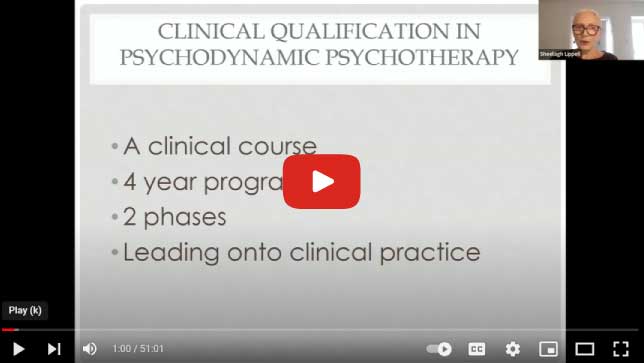
Psychodynamic Psychotherapy Training
Train to work with clients once per week.
- Part-time professional course.
- Weekly in-person study in London, with some additional course components online.
- Accredited by the British Psychoanalytic Council.
- Qualified therapists can enquire about joining via modified entry and starting in Year 3 of this programme.
This clinical training leads to qualification as an adult psychodynamic psychotherapist, ready to work with clients once per week.
This course offers a comprehensive exploration of psychotherapeutic concepts from multiple theoretical perspectives, including psychoanalytic, Kleinian, Jungian, and Independent schools of thought. There are 2 clinical phases in this course:
- A voluntary placement in the Foundation Course followed by a psychotherapy placement (ie. the NHS or other organisational setting) in Year 2 (both supported by our Clinical Placement Tutor)
- Working with two training patients in Years 3 and 4 sourced by our Director of Clinical Services.
Application closing date is 31st July 2025.
Modified Entry:
Qualified therapists can enquire about joining via modified entry and starting in Year 3 of this programme. To discuss your eligibility, email us at: [email protected]
Application Deadline:
Applications will open on 3rd March 2025. Closing date for October 2025 start is: 31st July 2025.
For further details about the application process, please see the ‘How to apply’ section on this page.
Before applying to this training you are required to have completed (or to be currently studying) our Foundation Course.
Applicants who have completed a foundation course, certificate or diploma at another psychoanalytic/psychodynamic training institution can apply, but we recommend contacting us at: [email protected] to discuss your eligibility prior to making an application.
To apply, please download and complete an application form by clicking the button below.
- Course Structure
- Course Fees
- Funding
- Entry Criteria
- Resources
- Training Pathway
- How to Apply
Our Foundation Course is now the first year of this 4-year bpf psychodynamic psychotherapy training. After completing the Foundation Course you can apply to join year 2 of the bpf psychodynamic psychotherapy training, which takes a further 3 years to complete and leads to qualification as a psychodynamic psychotherapist.
If you have completed a similar foundation course elsewhere you can still be considered for entry to year 2 of the programme, however the external training will need to cover the same core components of our Foundation Course. Qualified therapists can enquire about joining via modified entry and starting in Year 3 of this programme.
Foundation Course
Trainees will attend theory study days on a Saturday once a month and fortnightly clinical seminars. This can either be in-person or online. The clinical seminars are taught and are skills-based. Trainees will be in a voluntary placement or equivalent (see entry criteria) and/or have relevant professional experience (e.g. nursing, social work, teaching). Trainees do not need to be in supervision groups during the foundation year as they will not be seeing patients. Trainee clinical presentations for the clinical seminars evolve over time and are in essence work discussion groups.
Year 2
Trainees will be in a psychotherapy placement (NHS, or other organisational setting). Clinical work with patients in placements must be face to face but can be done locally to you. Trainees will attend theory seminars, clinical seminars and experiential groups in person at the bpf once a week during term time on a Monday afternoon. Trainees will also attend supervision groups outside the teaching days, either in person or online. Supervision group are no more than three trainees. One clinical supervisor is needed for Year 2 and this cost is included in the annual fee.
Year 3
Trainees will need to have a psychiatric placement or take part in a two day psychiatric simulation programme as this is a BPC requirement for the title of psychodynamic psychotherapist rather than counsellor. Trainees can apply to take on their training patients (from The Low Fee Therapy Scheme Manager and Clinical Services). Trainees need to see two once-weekly patients for at least a year. This is the BPC minimum requirement. The bpf will offer them up to four training patients though. This is to give trainees more experience and also act as a buffer if any training patients drop out. Trainees will take these patients into private practice but can also see their training patients in a placement if they prefer. In short, trainees can do a mixture of private practice and placement work if they so choose.
A second supervisor is required for Years 3 & 4 of the course. The first is included in annual fees, the second will be paid for separately by trainees. The estimated cost of a second supervisor will be approximately £800-1000 per year, if arranged via an approved bpf scheme. Second supervisors can also be arranged privately by trainees; prices will vary for this service.
Trainees will have theory seminars, clinical seminars and experiential groups in-person at The bpf on Friday mornings and also attend supervision groups outside teaching days, either in-person or online. Supervision groups are no more than three trainees.
Year 4
Same as Year 3, except that teaching seminars take place in-person at The bpf on Friday afternoons and there is no experiential group.
Year 5
While submitting their final papers and waiting to qualify, ALL trainees will be required to undertake an additional autumn term of training, with a reduced schedule and fee (see course fees). Some trainees may need longer to qualify, in which case additional training will be arranged on a termly basis.
Trainees are expected to be in personal therapy for the entirety of their training, ideally at least six months before they enrol. Training therapists should be psychoanalytic psychotherapists or Jungian analysts (5 years post qualified, BPC registrants). Therapy must be face to face and, moreover, finding a local therapist may be more difficult in rural settings. Patient work and placements must be face to face but can be done locally to you.
Course Fees
2025-2026 Prices:
This clinical training takes 4 years and 1 term to complete (if starting at Foundation level):
Foundation Course (Year 1) – £5150
This course does not include an Infant Observation.
For trainees joining the course in 2025 training fees will be (subject to annual increases in-line with inflation):
| Yr 2 | Yr 3 | Yr 4 | Yr 5 per term* |
| £7,420 | £7,420 | £7,420 | £700* |
For existing trainees 25/26 fees will be:
| Yr 3 | Yr 4 | Yr 5 per term* |
| £6,546 | £6,546 | £700* |
The cost of a first supervisor is covered by course fees throughout the entire course. The cost of a second supervisor in Year 3 & 4 is not included in course fees. The estimated cost of a second supervisor will be approximately £800-£1000 per year, if arranged via an approved bpf scheme. Second supervisors can also be arranged privately by trainees; prices will vary for this service.
Trainee Membership
To work with clients, all trainees must hold a bpf trainee membership.
Trainee membership costs:
£101.65 p/a during Foundation Course .
£144.45 p/a during years 2, 3 & 4 until qualification.
The Clinical Qualification in Psychodynamic Psychotherapy is a professional qualification that leads to qualification as a Psychodynamic Psychotherapist. This course is not an academic qualification.
Students pay for this training with self-funding, a private student loan, or employer sponsorship.
Please see our Financial Guidance page for more information.
Entry Requirements for Year 1/Foundation Year
- Relevant professional or voluntary experience (e.g. nursing, social work, teaching, befriending, crisis-line work)
- Undergraduate degree or other evidence of academic ability
- Counselling or counselling-related experience in professional or voluntary capacity
- Emotional resilience and capacity for self-reflection
Direct Entry into Year 2
The lead-in to Year 2 of the Psychodynamic Psychotherapy training is from The bpf Foundation Course (also known as Year 1). Those who have completed our MSc Psychodynamics of Human Development can also apply to join Year 2 of this training.
We are able to consider applications from those who have studied a Diploma, Certificate or Foundation Course at a different psychodynamic or psychoanalytic training institution. We recommend you contact us, before applying, to discuss your experience at: [email protected]
What we need to know are the answers to the following questions:
- Was the training psychodynamic/psychanalytic/Jungian analytic in nature?
- Was there a taught component for clinical seminars?
- Was there an observational component and/or work discussion group seminars?
- Did you attend a placement and/or see patients under supervision?
- Was this a psychotherapy placement (NHS, or other organisational setting)?
- Did you accrue clinical hours?
- Do you have clinical supervisors’ reports?
Direct Entry into Year 3
Qualified therapists can enquire about joining via modified entry and starting in Year 3 of this programme. To discuss your eligibility, email us at: [email protected]
Attend our Virtual Open Day to watch a presentation about this course.

Blogs
Frequently Asked Questions About Psychodynamic Psychotherapy
How to become a psychotherapist in the UK – The British Psychotherapy Foundation
My Journey as a Black Trainee in Psychodynamic Psychotherapy – The British Psychotherapy Foundation
How Couples Psychotherapy Can Transform Relationships – The British Psychotherapy Foundation
Why become a psychotherapist? (part I)
Why become a psychotherapist? (part II)
Videos
What’s it like to be a psychotherapist? Psychoanalytic psychotherapist (youtube.com)
What’s it like to be a psychotherapist? Child and Adolescent Psychotherapist (youtube.com)
What’s it like to be a psychotherapist? Jungian Analyst (youtube.com)
See our Psychotherapy Training Pathways diagram to view the potential pathways to qualification as a psychotherapist or analyst.
To apply to Year 1 of this training, visit our Foundation Course page.
To apply for the clinical component of this training (Years 2-4), please download and complete an application form by clicking the button below. After completing Years 2-4 of this course, students will qualify as a Psychodynamic Psychotherapist and be able to register as a member of the the British Psychoanalytic Council (BPC) and the British Psychotherapy Foundation (bpf).
On rare occasions, students that have not completed the necessary amount of clinical work during the course will be need to continue accruing clinical experience after the course has finished in order to qualify.
Please submit your completed application form (as a Word doc) via email to the PD Training Coordinator at: [email protected] and complete the online payment of the application fee (£170) by clicking the button below.
The application fee is to cover the cost of two interviews. If no interviews are offered, your application fee will be returned. Your application cannot be processed until you pay the application fee.
If you have completed a Foundation Course at another organisation, you may be considered for entry into Year 2 of the course. Please email: [email protected] to discuss your eligibility.
It has been wonderful to have studied at the bpf, it has changed so many perspectives in my life and I truly cherish this rich experience.”
Catia, bpf Student
Simply, it exceeded all my expectations, and sufficiently impressed and enthused me to consider a future career in psychotherapy. On a personal level it has changed me; something that has been accelerated by beginning my own personal analysis. I find myself thinking about non-verbal communications much more as a consequence of having attended the course.”
bpf Student
The ‘course has allowed to dip my toe into the analytic world and provided a broad overview of the analytic landscape. It has enhanced my understanding of psychoanalytic ideas and I’ve particularly benefited from speaking to experienced clinicians. The discussion groups in particular have been useful to clarify my own ideas and get a different perspective from others. Overall, it has helped me to determine if I would like to pursue work in this field.”
bpf Student
Upcoming Events:

Support the bpf
Help us to make psychotherapy training and low-fee clinical services both equitable and affordable, ensuring that a broader and more diverse range of people can easily access them.

New Courses Starting in 2025
Online:
- Psychodynamic and Jungian Theory for Qualified Practitioners (Taught Online)
bpf North:
- Foundation Course (Taught in Newcastle)
- Psychoanalytic & Psychodynamic Psychotherapy Training (Taught in Newcastle & Online)

